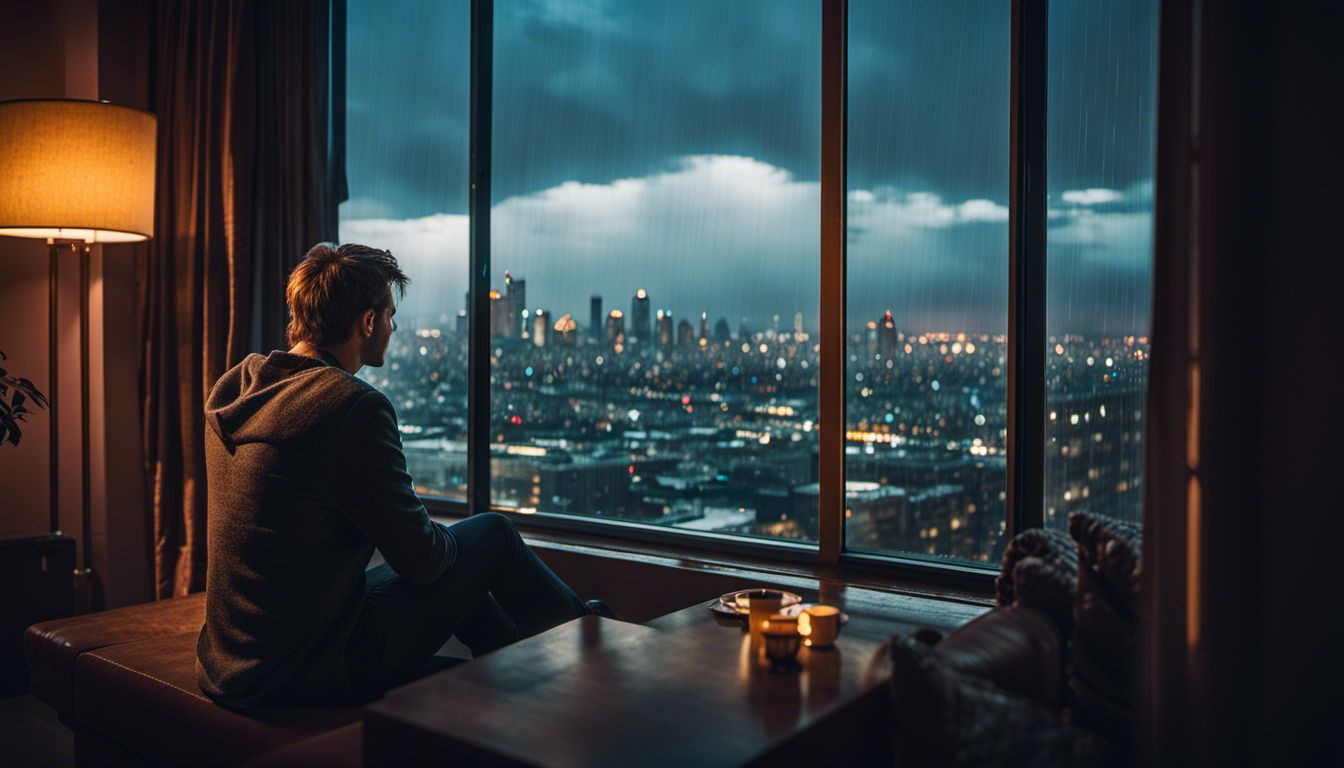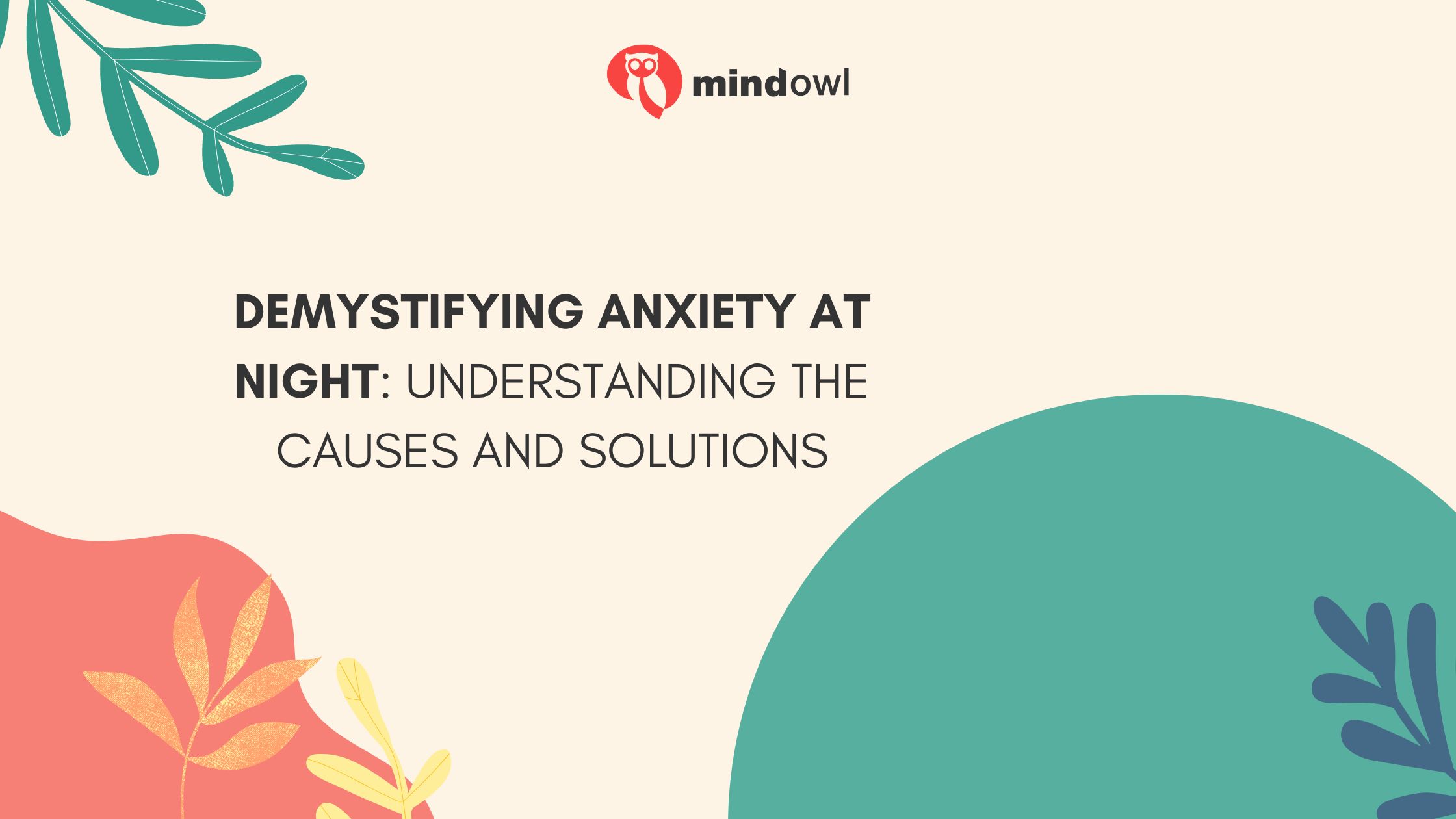Are you struggling with anxiety that seems to worsen when night falls? Studies show that nighttime anxiety, a common issue among adults, can seriously interfere with sleep quality.
This blog post discusses why anxiety heightens during the night and how it disrupts our restful slumber. Stick around to learn about various ways of tackling this pesky problem for better nights ahead.
Key Takeaways
- Anxiety at night can intensify due to factors such as quiet and solitude, hormonal changes, environmental triggers, and anticipation of sleep issues.
- Symptoms of anxiety at night include racing thoughts, heart palpitations, restlessness, difficulty concentrating, and nocturnal panic attacks.
- Poor sleep quality caused by anxiety can lead to fatigue, decreased concentration during the day, worsened symptoms of anxiety, and increased risk of developing other mental health conditions like depression.
- Strategies to calm anxiety at night include establishing a bedtime routine with consistent sleep schedules and relaxing pre-sleep activities, journaling before bed to clear the mind, snacking on sleep-promoting foods like almonds or chamomile tea in moderation,
Understanding Anxiety at Night

Anxiety at night can be particularly challenging because it often intensifies, causing symptoms such as racing thoughts and restlessness.
Why anxiety is worse at night
Anxiety often seems to increase in intensity during the night. The quiet and solitude that comes with nighttime can make our worries, fears, and anxieties appear larger than they really are.
As distractions fade away after dusk, anxious thoughts have free reign over the mind, magnifying their impact. Our bodies also contribute to this issue as hormonal changes at night such as a decrease in cortisol – a natural anti-anxiety hormone – can lead to heightened feelings of anxiety.
Furthermore, environmental factors like dark rooms or silence may trigger anxiety for some individuals due to associated fears or past traumas. Lastly, anticipation of potential sleep issues due to anxiety might ironically fuel more anxiety around bedtime.
Symptoms of anxiety at night
Anxiety at night might manifest in diverse ways. Here are some symptoms you might experience:
- Racing thoughts keep you wide awake.
- Heart palpitations create a sense of unease.
- Chills and hot flashes disrupt your comfort.
- Restlessness prevents relaxation and calming down.
- Difficulty concentrating makes sleep challenging to achieve.
- Constant worry overruns the mind.
- Shortness of breath intensifies feelings of panic.
- Nausea or stomach issues can occur quite frequently.
- A numb or tingling sensation may appear unexpectedly.
- Sweating profusely adds to discomfort, making it difficult to sleep peacefully.
- The sudden onset of fear gives birth to nocturnal panic attacks.
Causes of anxiety at night
Many factors can trigger anxiety at night, creating a debilitating cycle of worry and sleeplessness. Stress from daily life, such as work pressures or personal conflicts, often buzzes harder in our heads when we try to relax, disrupting peaceful rest.
Pre-existing anxiety disorders like generalized anxiety disorder or panic attacks can also become more intense during the twilight hours.
Eating too close to bedtime could lead to physical discomfort that heightens nervousness and fearfulness. Similarly, consuming caffeine or alcohol late in the day affects your ability to fall asleep and stay asleep, leading to nighttime anxiety.
Poor sleep habits are another instigator – irregular bedtimes don’t give your body an opportunity for a steady routine of rejuvenation; this lack of predictability might increase feelings of anxiousness at dark time.
Impact of Anxiety on Sleep

Anxiety negatively affects sleep quality, leading to consequences such as fatigue and difficulty concentrating during the day.
How anxiety affects sleep quality
Anxiety can significantly impact the quality of your sleep. When you experience anxiety, it can make it difficult to fall asleep and stay asleep throughout the night. This can result in poor sleep quality and leave you feeling tired and groggy during the day.
Anxiety may cause racing thoughts, worry, and physical symptoms like a rapid heartbeat or tense muscles that keep you awake at night. Getting a good night’s sleep is essential for overall well-being, so finding ways to calm anxiety before bed is crucial for improving sleep quality.
Consequences of poor sleep due to anxiety
Poor sleep due to anxiety can have significant consequences on both your physical and mental well-being. When you don’t get enough quality sleep, it can lead to increased fatigue and exhaustion during the day, making it harder for you to concentrate and perform at your best.
Lack of sleep can also worsen symptoms of anxiety, contributing to a vicious cycle where anxiety interferes with sleep, and lack of sleep fuels anxiety. Additionally, inadequate sleep has been linked to an increased risk of developing other mental health conditions such as depression.
It’s crucial to address the impact of poor sleep caused by anxiety in order to improve your overall health and well-being.
Strategies to Calm Anxiety at Night
Establish a bedtime routine, such as taking a warm bath or reading a book, to signal to your body that it’s time to relax and wind down for sleep.
Establishing a bedtime routine
Establishing a regular bedtime routine can help calm anxiety at night and improve sleep quality. Here are some strategies to consider:
- Set a consistent sleep schedule, going to bed and waking up at the same time each day.
- Create a relaxing pre – sleep routine, such as taking a warm bath or practicing gentle stretching.
- Limit exposure to screens before bed, as the blue light can disrupt sleep patterns.
- Create a comfortable sleeping environment by keeping your bedroom cool, quiet, and dark.
- Avoid caffeine and stimulating activities in the evening that can interfere with sleep.
- Practice relaxation techniques like deep breathing or meditation to calm your mind before bed.
- Write in a journal to release any worries or thoughts that may be keeping you awake.
- Use aromatherapy with calming scents like lavender or chamomile to promote relaxation.
- Avoid large meals close to bedtime, but consider having a light snack if hunger is keeping you awake.
- Keep electronics out of the bedroom and designate it as a space solely for rest.
Journaling before bed
Writing in a journal before bed can be an effective strategy to calm anxiety at night. By putting your thoughts and worries on paper, you can help clear your mind before sleep, making it easier to relax.
Journaling allows you to express your emotions and reflect on your day, helping to release any pent-up feelings that may be causing anxiety. It also provides an opportunity for self-reflection and problem-solving, as you can identify patterns or triggers of anxiety that may arise during the day.
Overall, journaling before bed can promote a sense of peace and tranquility, allowing for better sleep quality.
Snacking on sleep-promoting foods
Eating sleep-promoting foods can help calm anxiety at night. Here are some options:
- A handful of almonds: Almonds are rich in magnesium, which can promote relaxation and improve sleep quality.
- A small bowl of oatmeal: Oatmeal contains complex carbohydrates that increase the production of serotonin, a neurotransmitter that promotes feelings of calmness and relaxation.
- A cup of chamomile tea: Chamomile tea has natural compounds that have been shown to reduce anxiety and promote better sleep.
- Greek yogurt with berries: Greek yogurt is high in protein, which can help regulate blood sugar levels and prevent nighttime hunger, while berries contain antioxidants that promote restful sleep.
- A slice of whole-grain toast with peanut butter: Whole-grain toast provides long-lasting energy throughout the night, while peanut butter contains tryptophan, an amino acid that helps regulate sleep.
Getting out of bed if unable to sleep
If you find yourself unable to fall asleep, it may be helpful to get out of bed. Trying to force sleep can actually increase anxiety and make sleep even more elusive. Instead, try getting up and engaging in a relaxing activity until you begin to feel sleepy again.
This could include reading a book, listening to soothing music, or practicing deep breathing exercises. By leaving the bed and changing your environment, you break the association between wakefulness and your sleeping space, making it easier for your body and mind to relax when you return.
Remember that it’s important not to engage in stimulating activities or use electronic devices during this time as they can interfere with sleep onset.
Treatments for Nighttime Anxiety
There are several effective treatments for nighttime anxiety, including cognitive-behavioral therapy, healthy sleep habits, and medication options.
Cognitive-behavioral therapy
Cognitive-behavioral therapy (CBT) is an effective treatment for nighttime anxiety. This type of therapy focuses on identifying and changing negative thought patterns and behaviors that contribute to anxiety.
Through CBT, individuals learn strategies to challenge anxious thoughts and replace them with more realistic and helpful ones. They also develop coping skills to manage anxiety symptoms, such as deep breathing exercises or progressive muscle relaxation techniques.
By addressing the underlying causes of nighttime anxiety, CBT can help individuals regain control over their minds and sleep peacefully at night.
Healthy sleep habits
Establishing healthy sleep habits is crucial for managing anxiety at night. Here are some strategies that can help:
- Stick to a consistent sleep schedule, going to bed and waking up at the same time every day.
- Create a relaxing bedtime routine to signal your body that it’s time to wind down.
- Make sure your sleep environment is comfortable, cool, and dark.
- Avoid stimulating activities and screens before bed, as they can interfere with falling asleep.
- Engage in regular exercise during the day to promote better sleep at night.
- Limit caffeine intake, especially in the afternoon and evening.
- Practice relaxation techniques such as deep breathing or meditation before bed.
- Avoid heavy meals and excessive fluids close to bedtime to minimize disruptions during the night.
Medication options
Medication can be an effective option for managing nighttime anxiety. There are different types of medications that doctors may prescribe, such as anti-anxiety medications or antidepressants.
These medications work by helping to reduce anxiety symptoms and promote a sense of calm. It’s important to speak with a healthcare professional about the potential benefits and risks associated with medication options.
They can help determine which medication may be most suitable for your individual needs. Keep in mind that medication is often used in combination with therapy and lifestyle changes for the best results in managing nighttime anxiety.
When to Seek Professional Help
If you experience severe and persistent nighttime anxiety that significantly impacts your daily life and sleep, it is important to consult with a healthcare professional for further evaluation and potential treatment options.
Signs that indicate the need for medical intervention
- Noticeable decline in overall quality of life
- Difficulty functioning in daily activities due to anxiety
- Persistent and uncontrollable worrying
- Frequent panic attacks, especially at night
- Development of other mental health disorders, such as depression
- Physical symptoms that interfere with daily life, such as rapid heartbeat or shortness of breath
Talking to a doctor about nighttime anxiety
If nighttime anxiety is impacting your quality of sleep and overall well-being, it may be time to talk to a doctor. Your doctor can help determine if your anxiety symptoms are related to an underlying condition and recommend appropriate treatment options.
They may ask about your sleep patterns, daily stressors, and any other symptoms you experience. It’s important to be open and honest with your doctor so they can provide the best care possible.
Remember that reaching out for professional help is a sign of strength, and there are effective treatments available for managing nighttime anxiety.
When Nighttime Anxiety May Require Urgent Care
While anxiety and panic attacks can often be managed at home, there are some cases when you should consider urgent care or emergency treatment:
- You have symptoms of a panic attack like rapid heartbeat, shortness of breath, dizziness that last longer than 10-15 minutes
- You fear you may hurt yourself or others
- You experience suicidal thoughts
- Physical symptoms do not improve over time (e.g. chest pain, feeling faint)
Getting urgent care for a panic attack can help rule out other potentially serious medical issues and provide medications to help stop a severe attack. Do not hesitate to call emergency services or go to an [urgent care clinic] if you need immediate help getting severe anxiety or panic symptoms under control.
Lifestyle Tips for Managing Anxiety at Night
Incorporate meditation and deep breathing exercises into your nightly routine.
Incorporating meditation and deep breathing exercises
Meditation and deep breathing exercises can help calm anxiety at night. Here are some techniques you can try:
- Mindful breathing: Take slow, deep breaths in through your nose and exhale slowly through your mouth. Focus on the sensation of your breath entering and leaving your body.
- Progressive muscle relaxation: Start by tensing and releasing each muscle group in your body, one at a time. This can help release tension and promote relaxation.
- Guided imagery: Imagine yourself in a peaceful, calming place. Visualize all the details of this place to distract your mind from anxious thoughts.
- Body scan meditation: Close your eyes and mentally scan your body from head to toe, paying attention to any sensations or areas of tension. Allow yourself to release any tension you may feel.
- Loving-kindness meditation: Repeat positive affirmations or well wishes for yourself and others. This practice can promote feelings of compassion and reduce anxiety.
- Box breathing technique: Inhale deeply for a count of four, hold for a count of four, exhale for a count of four, and hold again for a count of four. Repeat this cycle several times to help lower anxiety levels.
Practicing grounding techniques
Practicing grounding techniques can help calm anxiety at night. Here are some strategies to try:
- Focus on your senses: Name five things you can see, four things you can hear, three things you can touch, two things you can smell, and one thing you can taste.
- Deep breathing exercises: Take slow, deep breaths in through your nose and out through your mouth. Focus on the sensation of your breath entering and leaving your body.
- Use physical sensations: Hold an ice cube in your hand or squeeze a stress ball to bring yourself back to the present moment.
- Visualization: Imagine yourself in a calm and peaceful place. Picture every detail of this place to distract yourself from anxious thoughts.
- Engage in physical activity: Go for a walk, do some stretches, or engage in any form of exercise that helps release tension and promotes relaxation.
- Practice mindfulness: Stay present by focusing on each moment as it happens. Pay attention to the sights, sounds, and sensations around you.
Creating a to-do list for the next day
Creating a to-do list for the next day can be a helpful strategy for managing anxiety at night. By writing down tasks and responsibilities that need to be accomplished, you can alleviate some of the worry and stress that might keep you awake.
Seeing your plans on paper helps to organize your thoughts and gives you a sense of control over your day ahead. Plus, when you have a clear plan in place, it’s easier to relax knowing that everything is accounted for.
So take a few minutes before bed each night to jot down what needs to be done tomorrow – it might just help calm your mind and improve your sleep quality.
Adopting healthy sleep habits
Adopting healthy sleep habits can help improve sleep quality and reduce anxiety at night. Here are some strategies to consider:
- Establish a consistent bedtime routine
- Create a calm and comfortable sleep environment
- Avoid stimulating activities or electronics before bed
- Limit caffeine and alcohol intake, especially in the evening
- Engage in regular exercise during the day, but not too close to bedtime
- Practice relaxation techniques, such as deep breathing or meditation, before sleep
- Stick to a regular sleep schedule, even on weekends
- Limit napping during the day, especially in the late afternoon or evening
Conclusion
In conclusion, anxiety at night is a common experience that can significantly impact sleep quality and overall well-being. Fortunately, there are strategies and treatments available to help calm nighttime anxiety and improve sleep.
By establishing a bedtime routine, seeking professional help when needed, and incorporating lifestyle tips for managing anxiety, individuals can take steps towards better sleep and reduced nighttime anxiety.
Remember, you don’t have to struggle with anxiety and sleep problems – there are resources and support available to help you find relief.
FAQs
Q: What is Anxiety At Night?
A: Anxiety At Night refers to the experience of feeling anxious, stressed, or having anxious thoughts specifically during nighttime. It can disrupt sleep and cause various symptoms that affect overall well-being.
Q: What causes anxiety at night?
A: Anxiety at night can be caused by various factors. Some common causes include stress and anxiety experienced during the day, sleep problems or disorders, sleep deprivation, and having anxious thoughts or worries that keep you awake.
Q: Why does anxiety get worse at night?
A: Anxiety can get worse at night due to several reasons. During the day, distractions, responsibilities, and activities may help keep anxiety at bay. However, when it’s time to wind down and go to bed, the absence of these distractions can allow anxious thoughts to surface, making it harder to relax and fall asleep.
Q: What are the symptoms of nighttime anxiety?
A: The symptoms of anxiety at night can vary from person to person. Some common symptoms include racing thoughts, difficulty falling asleep, waking up frequently during the night, nightmares, restlessness, increased heart rate or palpitations, and general feelings of unease or fear.
Q: How does anxiety affect sleep?
A: Anxiety can have a significant impact on sleep. It can make it harder to fall asleep, cause frequent awakenings during the night, reduce the overall quality of sleep, and lead to sleep deprivation. Sleep deprivation, in turn, can worsen anxiety symptoms, creating a cycle of sleep disruption and increased anxiety.
Q: Can anxiety cause sleep problems?
A: Yes, anxiety can cause sleep problems. People with anxiety often experience sleep disturbances, such as insomnia or restless sleep. Anxiety can make it difficult to relax and quiet the mind, leading to difficulty falling asleep or staying asleep throughout the night.
Q: How can I get better sleep if I experience anxiety at night?
A: There are several strategies you can try to improve sleep if you experience anxiety at night. Practicing good sleep hygiene, such as sticking to a regular sleep schedule, creating a calming bedtime routine, and creating a sleep-friendly environment can help. It’s also important to manage anxiety during the day through relaxation techniques, stress reduction, and seeking support from a healthcare professional if needed.
Q: Is anxiety worse at night?
A: Anxiety can sometimes feel worse at night due to the reasons mentioned earlier. The absence of daytime distractions, the quietness, and the lack of external stimulation can intensify anxious thoughts and make it harder to cope with anxiety.
Q: Can anxiety and stress cause symptoms to happen at night?
A: Yes, anxiety and stress can cause symptoms to happen at night. When you are experiencing anxiety or stress, your body’s stress response system is activated, which can lead to physical and psychological symptoms. These symptoms can manifest at night, particularly when you are trying to relax and fall asleep.
Q: Are anxious thoughts more common at night?
A: Anxious thoughts can be more common at night for some individuals. The quiet and stillness of the nighttime can provide an opportunity for anxious thoughts to surface and become more prominent. It’s important to recognize this pattern and develop strategies to manage and cope with anxious thoughts if they frequently occur at night.
MindOwl Founder – My own struggles in life have led me to this path of understanding the human condition. I graduated with a bachelor’s degree in philosophy before completing a master’s degree in psychology at Regent’s University London. I then completed a postgraduate diploma in philosophical counselling before being trained in ACT (Acceptance and commitment therapy).
I’ve spent the last eight years studying the encounter of meditative practices with modern psychology.


